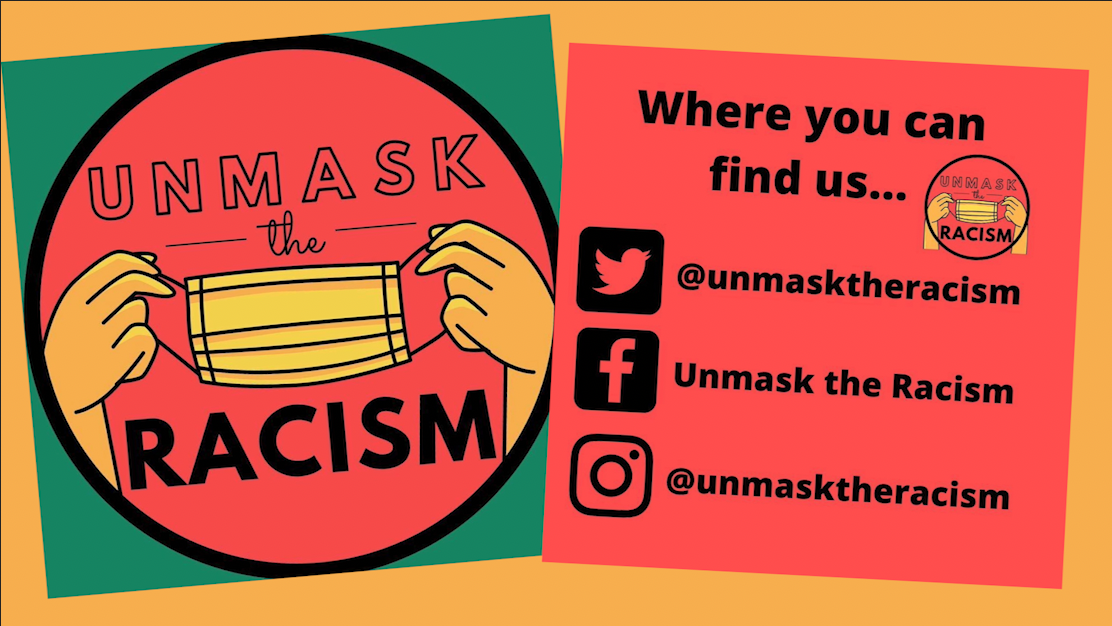Unmask the Racism: Social media campaign spreads awareness about anti-Asian racism

BOULDER, Colo. — We started Unmask the Racism in May 2020 in response to the increase in violence, harassment, and discrimination against Asian Americans in the United States.
Early in the pandemic, prominent public officials unabashedly called COVID-19 derogatory names like the “China virus” and the “kung flu,” contributing to xenophobia. Disheartened by brutal attacks on Asian communities throughout the country, and restless to do something about it, we came together to create a platform through which we could share stories, spark conversation, and initiate action to support Asian American communities in Boulder and beyond.
Related Story
Additional Resources
- Mental Health Center of Denver statement on anti-Asian violence
- Reporting Bias-Motivated Crimes in Denver
- Denver bias-motivated hotline: 720-913-6458 or email biascrimesinfo@denvergov.org (In an emergency, call 911 first)
- Reporting discrimination in Denver
- Violence Free Colorado statement on Atlanta attacks
- Asian Americans Advancing Justice
- Anti-Asian Violence Resources
- Stop AAPI Hate
However, since Unmask the Racism’s inception, hateful attacks against Asians have only increased. The tragic murder of eight people, six of whom were Asian women, in Atlanta is proof that these attacks are far from over and often target the most vulnerable members of our community. From March 2020 through February 2021, Stop AAPI Hate has reported 3,800 hate incidents, though this likely only represents a fraction of the number of hateful incidents that have occurred. Incidents often go unreported because of cultural reasons, since some do not want to call attention to these events out of fear for causing further harassment of close friends and family, and others simply lack knowledge of reporting tools or face language barriers in reporting.
The majority of attacks have involved verbal harassment, though physical assault and violence have become increasingly prevalent. Asian women reported hate incidents 2.3 times more often than Asian men, and many attacks have targeted elderly members of the Asian community, showing how intersecting vulnerabilities heighten the hatred shown to our community.
While the surge in hate towards Asians, particularly lighter-skinned East Asians, breaks from typical (East) Asian racism in the form of microaggressions and covert racist comments, they are a larger part of the cycles of xenophobia and “othering” of Asian Americans that has occurred since we first arrived in the United States. One version of this othering is through the myth of the perpetual foreigner, where Asian immigrants and their descendants are viewed as extensions of their “home” countries, explaining the xenophobic tendency to associate Chinese-passing individuals with COVID-19.
Another version comes in the form of the model minority myth, which emphasizes the supposed economic success, nuclear family structures, and hard work ethic of Japanese Americans. These “successes” apparently showed the ability of Japanese Americans to overcome the discrimination of interment during World War II, and these ideas came to dominate the mainstream idea of all Asian Americans in society. While this may be a “positive” stereotype, it is nonetheless quite harmful to Black and Latinx communities, whose demands for social, economic, and political change have been met with claims that other ethnic communities have been able to “lift themselves up by the bootstraps,” so why can’t they? Furthermore, the “model minority” myth is harmful to young Asian children who feel they have a reputation of intelligence and success to uphold. And it is perhaps most harmful to Asian Americans who do not fit the model minority mold, rendering invisible the gross economic disparities within Asian American communities, and even the voices and identities of South and Southeast Asians. Ultimately, this misunderstood history of the far-from-monolithic Asian American community continues to have powerful ramifications for all Asian Americans today, and it is our goal to disrupt these cycles of racism.

Our mission with Unmask the Racism is to provide resources and support within the Asian American community, as well as to promote inter-ethnic advocacy for our non-Asian supporters. We aim to spread awareness of the current issues we are facing by contextualizing present events with broader historical information about Asian Americans. We also strive to connect these educational tools to calls for change, to connect Asian Americans and advocates alike to genuine action to dismantle racism and xenophobia. Whether this is through contacting local officials or encouraging our followers to eat at Asian restaurants, we believe that connecting education to action is key to supporting broader social and cultural change that liberates not just Asian Americans, but all people of color in the United States.
As young individuals, we have immense power to inform our peers of the issues that we face to demand that anti-racism take a forefront in the way we understand and shape the world. We hope to inspire those around us to prevent future generations from experiencing racism and discrimination by helping to provide the tools necessary to dismantle systems of oppression. We need to speak up and call for change within our society. By combating racism and xenophobia together, we can make this a safer place for all.
We’d love for all of our supporters to follow us on our social media accounts (@unmasktheracism) and be a part of our mission by donating to our cause so we can support Asian businesses, or by participating in our More Than a 1000 Cranes Project so we can spread hope to those around us.
Our #wokitout GoFundMe can be found here.
